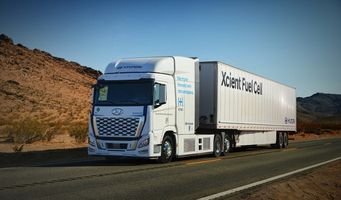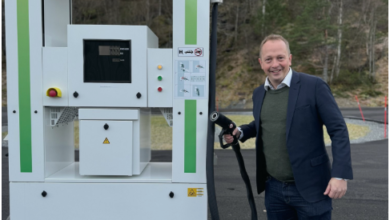Hyundai’s Xcient fuel cell on the way to California
The development of long-haul hydrogen-powered trucks is key to reducing emissions for providing immediate environmental benefits.

Hyundai Motor Company plans to deploy its latest hydrogen fuel cell heavy-duty electric trucks in California for two publicly funded projects to improve the air quality in the region.
The 70-tons demo trucks are developed based on Xcient Fuel Cell, the world’s first mass-produced, heavy-duty truck powered by hydrogen. The hydrogen will be stored in tanks rated at 700 bar, which would provide a maximum driving range of about 800 kilometres.
The truck debuted last year in Switzerland, where 46 units were delivered last year, and have cumulatively driven more than one million kilometres in 11 months of service in real-world conditions. In 2020, Hyundai announced its plan to deliver 1,600 Xcient fuel cell trucks to Europe by 2025.
Hyundai aims to gain insights from these public projects to develop its zero-emission commercial fleet business in the US and establish local partnerships across the value chain.
Hyundai is partnered with public and private partners in the US to run 30 units of Class 8 Xcient fuel cell trucks, starting Q2 2023, the largest commercial deployment of its kind in the US. The project will be supported by a $22 million grant won through a partnership of Hyundai Motor with a consortium led by the Center for Transportation and the Environment (CTE) from the California Air Resources Board (CARB) and the California Energy Commission (CEC). The project will also receive $7 million in additional grants from the Alameda County Transportation Commission and the Bay Area Air Quality Management District.
Hyundai’s NorCAL ZERO project, also known as Zero-Emission Regional Truck Operations with Fuel Cell Electric Trucks, will deploy 30 Class 8 Xcient fuel cell units with a 6×4 drive axle configuration to northern California by the second quarter of 2023. Glovis America, a logistics service provider, will be the fleet operator of these trucks. The consortium also plans to develop a high-capacity hydrogen refuelling station in Oakland, California, to support 50 trucks with an average fill of 30 kg.
Hannon Rasool, Deputy Director of Fuels and Transportation Division at the California Energy Commission, said, “These investments will support zero-emission trucks and infrastructure development and deployment as part of the US market ecosystem.”
In the other project, Hyundai was also awarded a $500,000 grant from the South Coast Air Quality Management District to demonstrate in Southern California two Class 8 Xcient fuel cell heavy-duty trucks, largely funded by the US Environmental Protection Agency (EPA). The operation of these trucks is expected in August and will be used for long-haul freight operations between warehouses in southern California for 12 months. Hyundai will work with First Element Fuel (FEF) to utilise three hydrogen refuelling stations for refuelling the trucks.
Ben J. Benoit, South Coast AQMD’s Governing Board chair, said, “The development of long-haul zero-emission truck technology is key to reducing emissions that will provide immediate benefits to our air and our communities.”
